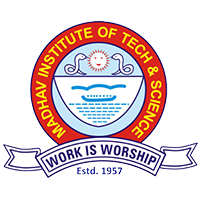Program Outcomes (POs)
PO I Engineering Knowledge: Apply the knowledge of mathematics, science, engineering fundamentals, and an engineering specialization to the solution of complex engineering problems.
PO II Problem Analysis: Identify, formulate, review research literature, and analyze complex engineering problems reaching substantiated conclusions using the first principles of mathematics, natural sciences, and engineering sciences.
PO III Design/Development of Solutions: Design solutions for complex engineering problems and design system components or processes that meet the specified needs with appropriate consideration for public health and safety, and cultural, societal, and environmental considerations.
PO IV Conduct Investigations of Complex Problems: Use research-based knowledge and research methods including design of experiments, analysis and interpretation of data, and synthesis of the information to provide valid conclusions.
PO V Modern Tool Usage: Create, select, and apply appropriate techniques, resources, and modern engineering and IT tools including prediction and modeling to complex engineering activities with an understanding of the limitations.
PO VI The Engineer and Society: Apply reasoning informed by the contextual knowledge to assess societal, health, safety, legal and cultural issues and the consequent responsibilities relevant to the professional engineering practice.
PO VII Environment and Sustainability: Understand the impact of the professional engineering solutions in societal and environmental contexts, and demonstrate the knowledge of, and need for sustainable development.
PO VIII Ethics: Apply ethical principles and commit to professional ethics and responsibilities and norms of the engineering practice.
PO IX Individual and Team work: Function effectively as an individual, and as a member or leader in diverse teams, and in multidisciplinary settings.
PO X Communication: Communicate effectively on complex engineering activities with the engineering community and with society at large, such as being able to comprehend and write effective reports and design documentation, make effective presentations, and give and receive clear instructions.
PO XI Project management and Finance: Demonstrate knowledge and understanding of the engineering and management principles and apply these to one's own work, as a member and leader in a team, to manage projects and in multidisciplinary environments.
PO XII Life-long Learning: Recognize the need for, and have the preparation and ability to engage in independent and life-long learning in the broadest context of technological change.
Programme Educational Objectives (PEOs)
PEO I Graduates of the program will develop innovative products and services in the field of Chemical Engineering and Allied Engineering disciplines.
PEO II Graduates of the program will blend the knowledge of Chemical Engineering with modern experimental and computational skills in higher education and research.
PEO III Graduates of the program will demonstrate professional excellence, ethics, soft skills and leadership qualities.
PEO IV Graduates of the program will internalize lifelong learning according to changing professional and societal needs.
Program Specific Outcomes (PSO)
PSO I Use of Computation & Simulation Tools: Graduates will be able to apply computational and simulation tools to design, solve & optimize chemical processes.
PSO II Process Design: Graduates will be able to design Unit Operations and Unit processes to solve engineering problems using basic principles and methods and exhibit proficiency in applying technology to industry, society and environmental concerns









